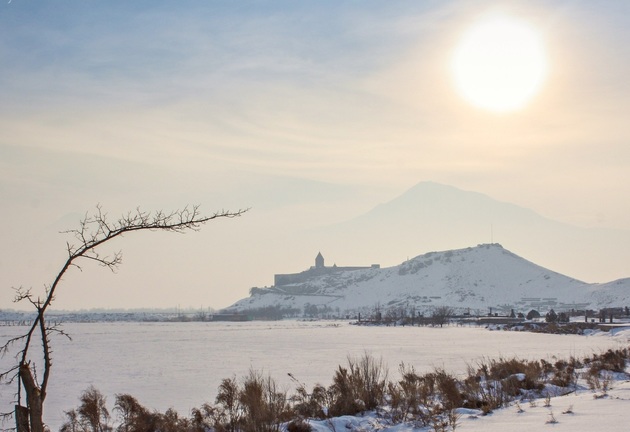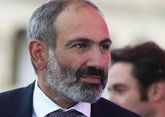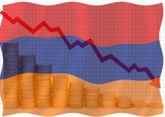Late last year, Armenian Prime Minister Nikol Pashinyan made a mouth-dropping speech in the parliament before the holidays: "Armenia surpassed neighboring Georgia by the GDP per capita based on the results of 2019, and based on the results of 2020 the republic would surpass Azerbaijan. Over the past 20 years, Armenia's performance in this indicator has always been the worst, next year we will be the first."
The neighboring countries didn't have time to let that sink in, but already at the beginning of 2020 Pashinyan again turned to this topic and clarified that he was wrong in his previous statement: "It turned out that at the end of 2019, we overtook both Georgia and Azerbaijan, becoming the leading country in the South Caucasus." The statement was accompanied by figures: Armenia's GDP per capita - $4,760, Azerbaijan - $4,720, Georgia - $4,630. The difference is insignificant and testifies, rather, to the same situation in the three republics, than to the real superiority of one over the others ... And soon Pashinyan came up with a clarification: "We haven’t surpassed Azerbaijan yet, but we will by the end of this year the latest."
In fact, numbers are a thing in itself. Numbers can show universal prosperity and happiness covering the entire population of the country, but in reality, people can be far from this prosperity and happiness. In achieving 'loud numbers' much depends on the methodology and desire. The leader’s speeches caused some embarrassment even in Armenia's expert circles. Former Prime Minister Hrant Bagratyan specifically announced that Pashinyan’s statements are incorrect in several respects. Here, of course, one can try to delve into alternative data, but also there is another, maybe a bit shallow, way, without delving into economic theories. It’s just to see how people live, without "taking the lead over neighboring states." And these are the store shelves, the number of packages carried by people after shopping, the car park, the condition of the roads, and, finally, people themselves - do they have smiling faces or, on the contrary, grim ones.
Following these "romantic" parameters, one comes to the conclusion that after the velvet revolution the life in Armenia was getting, if not much better, then fun. People got hope and the opportunity to rebuild their lives. No business restrictions. If you want to sell, for example, bananas, then go ahead, import them, carry out customs clearance and sell without fearing that some brave guys will drop these bananas in the nearest gorge as a sign that this direction of trade is monopolized by a guy named Alfred. And sugar, for example, can only be imported into Armenia by Albrecht. Whereas, fore example, flour is the business of Albertik Senior, and Dutch roses are the business of Albert Junior.
Probably, the destruction of artificial monopolies is the main success of the Armenian new authorities. Transparency and simplification of tax policy is also success. There was more than one entrepreneur (small or medium) in Armenia who scratched his head in surprise, having received back part of the money paid in taxes. But when financial inspectors stopped coming around with a proposal to pay taxes in advance to fulfill their plan, entrepreneurs realized: Pashinyan and his team are really trying to establish a new life in the country. And the optimistic suspicion was reinforced by the fact that the new government uncompromisingly and ruthlessly cut off from large business everything that had to be paid to in taxes the treasury for years. But it was not paid. And what kind of business they had! Someone with protection in high spheres cut his pipe into the state gas pipeline and ... Should I continue? And things like this used to happen.
Things are fine with stores and grocery shelves in Armenia - I saw it myself, I traveled to several cities during the New Year holidays. Of course, there are no small brand stores, but they are useless there, while the existing ones completely satisfy the urgent needs of the locals. As they say, anything for your money. The authorities with a clear conscience can recall that salaries of teachers and military personnel have been increased. Due to changes in tax legislation, as of January 1, 2020, salaries of more than 200 thousand people will be raised, pensions and minimum salaries will be increased by 6 and 2 times, respectively, payments for the first and second children, maternity benefits, etc. are also increased. In addition, there's an increase in the number of free medical programs, which makes it possible to redistribute the family or personal budget towards reducing tension.
Another quality of life indicator is cars. Of course, on the streets of Yerevan or on republican highways you can meet both Ferrari and Lamborghini, not to mention much ordinary prestigious cars. But the abundance of Russian cars is striking. Starting from VAZ-2106 and GAZ-24 on last legs, or absolutely 'exotic' GAZ-51 and GAZ-53 trucks, ending with the latest releases of the Togliatti plant. You may feel that you are not in Armenia, but somewhere in the central part of Russia, not particularly spoiled by luxury. Someone explains the preference for Russian cars as a habit, the other as the availability, the third explains this by cheap spare parts and maintenance, the fourth - by the cars' simplicity. Because roads in the province are something.
A friend of mine took me for a ride between two villages in the northern Armenia. At 10 kilometers of continuous potholes and potholes,I was so car sick that I had a suspicion that he's getting revenge for for some misconduct. When the "ride" was over, a friend explained that according to the documents, there's an asphalt road between the two villages, and now, if I'm interested, we can turn to the "road workers" and try to find out how much money the former authorities stole using this site, and there are probably a lot of such sites throughout Armenia. The revolutionary authorities are aware of the state of the roads. Pashinyan himself travels a lot in Armenia and not only on main roads, which are generally in good condition - in 2020, it is planned to rehabilitate and lay 500 kilometers of modern roads. That's a lot for small Armenia, and it is urgent and necessary, since one of the state's main stakes is on the development of tourism, which is an empty dream without a quality infrastructure.
A knowledgeable person said that he had no doubt that the road program would be completed and well-made: the conditions are the following: the government signs a contract with a company building the road according to standards, investing its own funds, and only after checking the quality of work, the contract funds are received by the contractor, or not received, until all defects are eliminated. Something similar is planned in the construction sector, especially in the disaster zone: 30 years (!) have passed since the earthquake, but housing problems still remain. And this is a challenge for the new authorities.
Another challenge for Pashinyan and his team was last year's saga of the Amulsar mountain mine, where some gold deposits were discovered in Soviet times. Then they were considered insignificant - by Soviet standards, it was not worth powder and shot. An independent Armenia, not rich in natural resources, is another thing. But the deposits are in close proximity to the famous Jermuk health resort. The local population, employed mostly by this resort, fears that mining will negatively affect the environment and ruin the resort, so they will be deprived of their sources of income. There's more, while being in the opposition, the current Armenian authorities shared these concerns, but when their political position qualitatively changed, they changed their attitude to the project - investments are needed, new jobs are needed, etc. And that's when Pashinyan stumbled for the first time. He stumbled where he was always strong - in the popular support issue. He had to retreat, promising a detailed examination of the possible consequences of the Amulsar gold mine development. It is unclear whether it will be possible to convince local residents, who block access to the field on the least occasion. So far, they are radically opposed to the project.
And yet, what has changed in Armenia after the change of power? Is the future of the republic which remains in a transport semi-blockade because of the Karabakh conflict, which bears heavy military expenses because of it, really optimistic? Of the country where the new government has to deal with the resistance of the old elite daily, which has to be overcome including by using resonant lawsuits all the time?
Of course, there is no consensus. The opposition believes that the coming year may be decisive for Nikol Pashinyan and his team. The resources, due to which a certain improvement was recorded, were used - I mean the above-mentioned "tax justice" regime. The volume of investments in 2019 has decreased compared to 2018, and there are no special signs it may change. But the negative costs associated with Armenia’s presence in the Eurasian Economic Union (EEU) will obviously be manifested - the abolition of transitional customs duties on car imports and the entry into force of the general rules of customs clearance of cars from non-EEU countries from January 1, 2020 will result in Armenia losing large tax revenues from importing foreign cars from Georgia, which were sent to other countries of the alliance already after being registered in Armenia. On January 1, 2020, the grace period of five years for the adaptation of the Armenian economy to the EEU ended. This means that the cost of imports from non-EEU countries is expected to increase. It is not clear how the authorities will be able to level the upcoming obvious difficulties.
Economist and analyst Emanuel Mkrtchyan writes: "Positive changes can be overlooked even by the most radical opponents of the authorities only if public finances are not used effectively, the share of expenditures on the development of human capital and infrastructures increases, loans and grants are not effectively spent, and the fight against the shadow economy, corruption, and work to create a competitive environment in the country does not continue."
"He should succeed," the phrase happened to be heard in Armenia more than once. It is not only about being optimistic about Pashinyan. But it's also about some kind of despair, almost an extreme hope. Exhausted by the difficult socio-economic situation, the society that brought Nikol Pashinyan to power in the spring of 2018, believes in him. But such trust is never eternal, or even very long-lasting. This year may turn out to be reporting to the new authorities. And if people don’t feel a concrete improvement in their quality of life, then announcements that "we have something better than our neighbors" can only be of interest to the neighbors themselves, and not all of them, but only "jealous" ones - Azerbaijan seems to have ignored Pashinyan's loud statement, but Georgia "got worried". But its economic condition is a story for another time.










